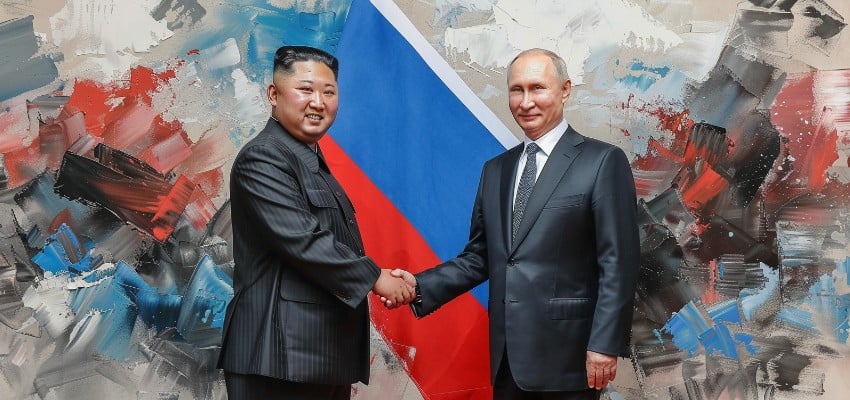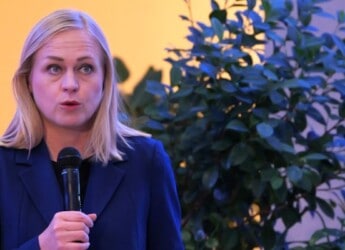Editor’s Note: This article summarizes key developments in the Russian-Ukrainian conflict as of June 21, 2024, based on reports from the Institute for the Study of War (ISW). It covers Russian President Vladimir Putin’s recent statements, diplomatic moves, and Ukrainian military actions.
The information presented here is particularly relevant for cybersecurity, information governance, and eDiscovery professionals involved in research, investigations, and litigation associated with potential human rights violations and war crimes arising from this conflict.
For cybersecurity professionals, Putin’s rhetoric on nuclear threats and the creation of a new Eurasian security architecture may signal increased cyber activity and potential attacks on critical infrastructure in both Ukraine and Western nations. The reported Ukrainian drone strikes on Russian territory also highlight the growing importance of cybersecurity in modern warfare, particularly in protecting against and detecting unmanned aerial systems.
Information governance specialists should note the emphasis on information warfare, as evidenced by Moscow State University’s new master’s program on “strategic communications, information, and hybrid wars.” This development underscores the need for robust systems to manage, protect, and authenticate information related to the conflict, especially given the potential for increased disinformation campaigns.
eDiscovery professionals will find the ongoing military actions and diplomatic maneuvers crucial for establishing timelines and contexts in potential war crimes investigations. The reported strikes on civilian infrastructure, such as oil refineries, may be particularly relevant in building cases related to violations of international humanitarian law. Additionally, the mention of Russia importing judges to occupied Ukrainian territories provides insight into the manipulation of legal systems in conflict zones, which could be critical in future legal proceedings.
For those seeking to grasp the full scope of this evolving landscape, the complete updates from the Institute for the Study of War serve as an invaluable resource.
Content Assessment: Russia's Dual Strategy: Nuclear Threats and Eurasian Alliances in the Ukraine War
Information - 94%
Insight - 92%
Relevance - 90%
Objectivity - 93%
Authority - 94%
93%
Excellent
A short percentage-based assessment of the qualitative benefit expressed as a percentage of positive reception of the recent update on the Russo-Ukrainian conflict as reported by ComplexDiscovery OÜ and sourced from the Institute for the Study of War.
Background Note: ComplexDiscovery’s staff offers distinctive perspectives on the Russo-Ukrainian war and Iran-Israel conflict, informed by military experience on the West German, East German, and Czechoslovakian border during the Cold War and in Sinai as part of Camp David Accord compliance activities. This firsthand regional knowledge has been further enhanced by recent staff travels to Eastern European countries, including Estonia, Latvia, Lithuania, and Poland. These visits have provided up-to-date, on-the-ground insights into the current geopolitical climate in regions directly impacted by the ongoing conflict.
Combined with proficiency in cybersecurity, information governance, and eDiscovery, this multifaceted experience enables comprehensive analysis of these conflicts, including the critical impact of cyber warfare, disinformation, and digital forensics on modern military engagements. This unique background positions ComplexDiscovery to provide valuable insights for conflict-related investigations and litigation, where understanding the interplay of technology, data, and geopolitical factors is crucial.
Russo-Ukrainian Conflict Update*
Russia’s Dual Strategy: Nuclear Threats and Eurasian Alliances in the Ukraine War
ComplexDiscovery Staff
As the conflict in Ukraine persists into its third year, Russian President Vladimir Putin continues to employ a multifaceted strategy combining nuclear deterrence rhetoric, diplomatic maneuvering, and attempts to reshape regional security structures. These efforts come as Ukrainian forces demonstrate increased capability to strike targets deep within Russian territory, potentially shifting the dynamics of the ongoing war.
On June 21, 2024, Putin addressed graduating Russian officers, emphasizing Russia’s commitment to developing its nuclear triad as a “guarantee of strategic deterrence” and maintaining global power balance. This statement followed his June 20 press conference in Vietnam, where he suggested the possibility of lowering the threshold for nuclear use in Russia’s doctrine. Putin went so far as to equate a potential Russian defeat in Ukraine with an existential threat to the Russian state, a move that analysts at the Institute for the Study of War (ISW) interpret as an attempt to invoke the “exceptional case” clause in Russia’s nuclear doctrine that could justify nuclear weapon use.
These nuclear-themed statements are part of a broader information campaign aimed at discouraging Western support for Ukraine and undermining international efforts to develop a cohesive strategy for decisively defeating Russia’s invasion. The ISW continues to assess that while nuclear threats are a core aspect of Russia’s strategy to manipulate foreign decision-makers, the likelihood of actual nuclear escalation remains low due to existing nuclear and conventional deterrence measures.
Simultaneously, Putin and Russian Foreign Minister Sergei Lavrov are promoting the concept of an alternative “Eurasian security architecture.” This initiative appears designed to establish a coalition of friendly states that could serve as a counterweight to NATO and the West. Putin expressed readiness to discuss Eurasian security issues with organizations such as the Shanghai Cooperation Organization (SCO), Commonwealth of Independent States (CIS), Eurasian Economic Union (EAEU), and BRICS. He also signaled openness to dialogue with European and NATO countries “when they are ready.”
Lavrov, speaking at a Collective Security Treaty Organization (CSTO) foreign ministers meeting in Kazakhstan, emphasized the need for this new Eurasian security framework to replace the existing Euro-Atlantic system. The Russian diplomatic push extends beyond traditional Eurasian boundaries, with Putin expressing interest in developing relations with ASEAN during his recent visit to Vietnam. This expansion of the Eurasian concept to include Southeast Asian nations suggests Russia is leveraging historical ties from the Soviet era to build a broader coalition.
The Russian Ministry of Foreign Affairs (MFA) has actively defended the recent Russian-North Korean strategic partnership agreement against criticism from South Korea and Japan. The MFA directly linked this agreement to Putin’s Eurasian security architecture initiative, framing it as part of a broader strategic realignment. This move has prompted South Korea to consider sending military aid to Ukraine, marking a potential shift in its policy.
While Russia focuses on these diplomatic and rhetorical strategies, Ukrainian forces have demonstrated increased capability to strike targets deep within Russian territory. On the night of June 20-21, Ukrainian drones targeted oil refineries in Krasnodar Krai and Astrakhan Oblast, as well as military installations in Bryansk Oblast and occupied Crimea. These strikes, which included attacks on Shahed drone storage facilities and military training centers, represent a significant escalation in Ukraine’s ability to project force into Russian territory.
Russian sources reported that the Ukrainian attacks came in waves, overwhelming Russian air defenses and reportedly leading to a friendly fire incident where a Russian air defense system accidentally shot down a Ka-29 helicopter. This incident has prompted criticism from Russian military bloggers regarding the effectiveness of Russian air defense systems and their Identification Friend or Foe (IFF) capabilities.
In a separate development reflecting the ongoing information warfare aspect of the conflict, Moscow State University (MGU) announced the reopening of a master’s program focused on “strategic communications, information, and hybrid wars.” The program, guided by ultranationalist former State Duma Deputy Zakhar Prilepin and other Duma members, aims to teach students about “national information sovereignty and countering the operations of hybrid, cognitive, and intellectual wars.” This educational initiative appears designed to promote Russian objectives for the war in Ukraine and strengthen the ideological underpinnings of Russia’s invasion over the long term.
As the conflict continues to evolve, these developments underscore the complex interplay of military operations, diplomatic maneuvering, and information warfare that characterize the ongoing struggle in Ukraine. The coming months will likely see further attempts by Russia to reshape regional security dynamics while Ukraine continues to demonstrate its growing military capabilities.
News Sources
- Institute for the Study of War (understandingwar.org)
- Russian Information Warfare Targets Ukraine’s Global Peace Summit (complexdiscovery.com)
- Current Events Archives – ComplexDiscovery
As a leading source for cybersecurity, information governance, and legal discovery insights, including international investigations and litigation, ComplexDiscovery OÜ recognizes the importance of awareness regarding alleged and documented criminal acts, particularly in the context of the Russia-Ukraine conflict. While we, following the lead of the Institute for the Study of War (ISW), do not provide detailed coverage of war crimes in our primary reports, we encourage professionals within the eDiscovery ecosystem to stay informed about these activities. This awareness is crucial for understanding potential future legal actions and responsibilities.
Detailed Reporting with Maps for June 21, 2024, from the ISW – Mouseover to Scroll
Ukraine Control of Terrain June 21, 2024Review the Detailed Reporting and Maps PDF
About the Institute for the Study of War Research Methodology
ISW’s research methodology relies on both primary and secondary sources, enabling researchers to develop a comprehensive understanding of the situation on the ground. In order to analyze military and political developments in any given area, ISW’s research analysts must wholly understand the systems of enemy and friendly forces. They must also understand the population demographics, physical terrain, politics, and history of that area. This lays the analytical foundation for understanding the reasons for particular developments and fulfilling their assigned research objectives. ISW analysts also spend time in places like Iraq, Afghanistan, and elsewhere in order to gain a better understanding of the security and political situation and to evaluate the implementation of current strategies and policies. Our researchers compile data and analyze trends, producing a granular analysis of developments in areas of research, producing an accurate, high-resolution, timely, and thorough picture of the situation. ISW’s research methodology guarantees its success and commitment to improving the nation’s ability to execute military operations, achieve strategic objectives, and respond to emerging problems that may require the use of American military power.
About the Institute for the Study of War
The Institute for the Study of War advances an informed understanding of military affairs through reliable research, trusted analysis, and innovative education. We are committed to improving the nation’s ability to execute military operations and respond to emerging threats in order to achieve U.S. strategic objectives. ISW is a non-partisan, non-profit, public policy research organization.
Learn more, get involved, and contribute today.
Additional Reading
- From Dissent to OSINT? Understanding, Influencing, and Protecting Roles, Reputation, and Revenue
- [Annual Update] International Cyber Law in Practice: Interactive Toolkit
- Data Embassies: Sovereignty, Security, and Continuity for Nation-States
Assisted by GAI and LLM Technologies
* Sourced and shared with direct express permission from the Institute for the Study of War (ISW).
Source: ComplexDiscovery OÜ



























